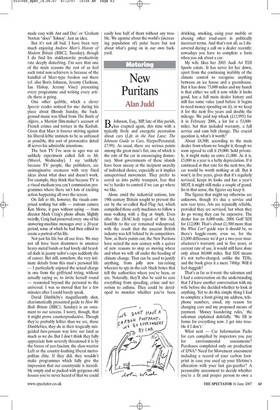I can't take Sugar
James Delingpole The other day I had to address a group of media students from Michigan State University on the purposes of TV criticism. I came up with about five, the last of which was: always impress on your audience what a massive waste of life almost all TVwatching is because it's mostly rubbish, it sucks out your brain and you're far better off with a book or the wireless.
Possibly they thought I was joking but you all know I wasn't. It's a variation on an argument I have every week with the Fawn over The Apprentice (BBC1, Wednesday). She thinks it's antisocial the way I read the newspaper through the longueurs and then head for an early bath rather than wait to find out who got fired. I say, 'Look, that programme is at least 20 minutes longer than it needs to be. The boardroom scenes, especially, are far too drawn out. And what useful life skills are you left with at the end?'
Call me a romantic, call me an elitist, but wouldn't our world be so much better a place if, instead of gathering round the watercooler to discuss the latest antics of manipulative Katie Hopkins or slippery Tre Azzam, office workers were saying stuff like, 'God, that Pierre's a prat, don't you think?"0h, I don't know. You warm to him after a while and he does acquit himself pretty well in the redoubt at Borodino."Right, I've only got as far as the wolf hunt at the moment, which rules totally.' Or what? But don't worry. It doesn't slacken. Except maybe at the very last bit where he comes over all mystical'?
You could even get the channels to cooperate. Instead of the usual tosh at 8 p.m. there'd be the simple message, 'Shouldn't you be reading your War And Peace?' Then perhaps, afterwards as a concession to dumbing down, there could be 'Russian made easy with Ant and Dec' or 'Graham Norton "does" Tolstoy'. Just an idea.
But it's not all bad. I have been very much enjoying Andrew Marr's History of Modern Britain (BBC2, Tuesday), though I do find his stakhanovite productivity rate deeply disturbing. I'm sure that one of the main reasons the rest of us feel such total non-achievers is because of the handful of Marr-type freakos out there (cf. also Boris Johnson, Jeremy Clarkson, Ian Hislop, Jeremy Vine) presenting every programme and writing every article there is going.
One other quibble, which a clever Speccie reader noticed for me: during his piece about Bloody Sunday, the background music was lifted from The Battle of Algiers, a Marxist film-maker's account of French crimes and torture in the Kasbah. Given that Marr is forever striving against his liberal-leftie instincts to be as unbiased as possible, this sort of provocative detail ill serves his admirable intentions.
The best TV I've seen in ages was an unlikely experiment called Talk to Me (More4, Wednesday). I say 'unlikely' because TV people, like publishers, are unimaginative creatures with very fixed ideas about what does and doesn't work. For example, they think that because TV is a visual medium you can't commission programmes where there isn't lots of exciting action happening all over the screen.
On Talk to Me, however, the visuals comprised nothing but stills — rostrum camera Ken Morse, it goes without saying — from director Mark Craig's photo album. Slightly weirdly, Craig had preserved every one of his answering-machine messages over a 20-year period, some of which he had then edited to create a portrait of his life.
Not just his life but all our lives. We may not all have been drummers in amateur heavy-metal bands or had lovely old bearded dads in jaunty sailor's caps suddenly die of cancer. But still, somehow, the very intimate details from this man's personal life — I particularly enjoyed the sexual charge in one from the girlfriend trying, without actually saying so, to invite herself round — resonated beyond the personal to the universal. I was so moved that for a few minutes after I could barely speak.
David Dimbleby's magnificently shot, charismatically presented guide to How We Built Britain (BBC1, Sunday) is an ornament to our screens. I worry, though, that it might prove counterproductive. Though they're probably leftier than we are, those Dimblebies, they do in their tragically misguided bien-pensant way love our land as much as we do. But I don't think they fully appreciate how severely threatened it is by the forces of eco-fascism, the class-warrior Left or the country-loathing liberal metropolitan elite. If they did, they wouldn't make programmes which fully give the impression that our countryside is incredibly empty and so packed with gorgeous old houses you've never heard of that we could easily lose half of them without any trouble. We agonise about the world's (increasing population of) polar bears but not about what's going on in our own backyard.





















































 Previous page
Previous page